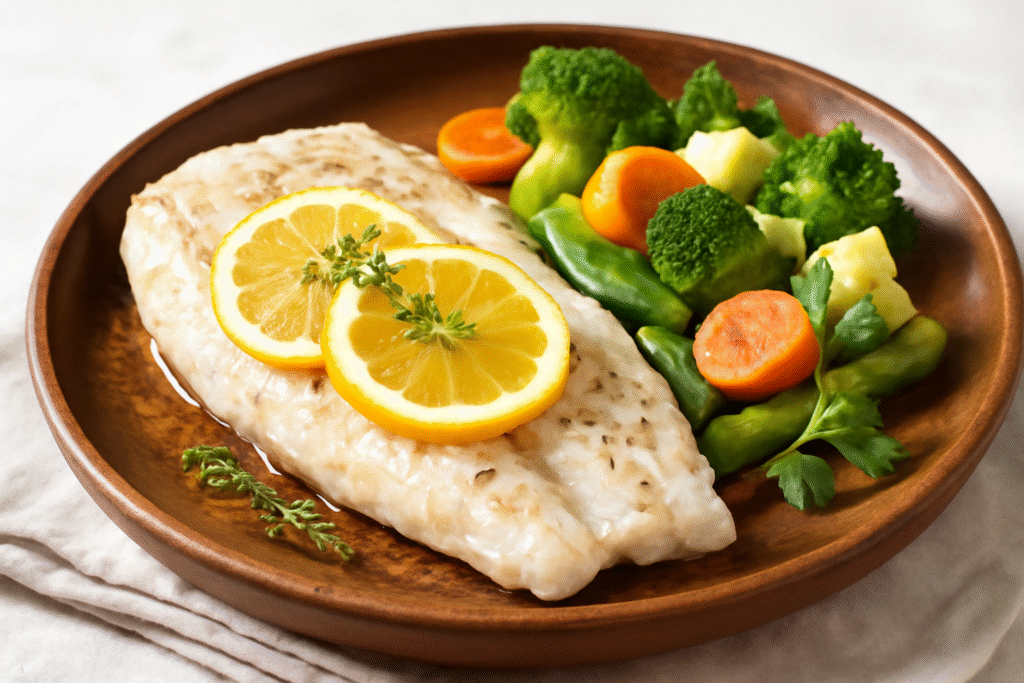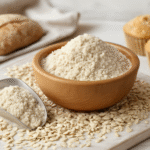Haddock, a mild white fish closely related to cod, is a staple in many traditional cuisines around the world. From the iconic British fish and chips to light, pan-seared fillets, haddock’s versatility in cooking is matched by its impressive nutritional profile. When we talk about haddock nutrition info, we uncover a lean protein source packed with vitamins, minerals, and heart-healthy benefits that make it a worthy addition to your diet.
For those seeking a low-calorie, high-protein food that also delivers essential micronutrients, haddock stands out as one of the best choices from the sea. Let’s dive deeper into its nutritional breakdown and health benefits.
Caloric Value of Haddock
Haddock is remarkably low in calories compared to many other animal proteins. A 100-gram cooked serving contains only about 90–100 calories. This makes it an excellent option for weight management, meal prepping, and anyone looking to maintain a lean diet without sacrificing taste or nutrition.
Protein Content in Haddock
One of the most notable aspects of haddock nutrition info is its high protein content. A 100-gram serving provides around 20 grams of protein. This lean protein helps build and repair tissues, supports immune function, and maintains muscle mass, especially important for athletes, fitness enthusiasts, and older adults.
Unlike red meats, haddock protein comes with minimal fat, making it easier on the digestive system while still offering satiety and energy.
Fat Content in Haddock
Haddock is naturally low in fat, containing only about 0.5–1 gram of fat per 100 grams. What little fat it does contain includes beneficial omega-3 fatty acids, which support heart health, brain function, and reduced inflammation. While haddock does not have as high omega-3 levels as salmon or mackerel, it still contributes to a balanced diet.
Carbohydrates in Haddock
Like most fish, haddock contains virtually zero carbohydrates. This makes it a suitable protein source for low-carb and ketogenic diets. It also provides a clean source of energy without spiking blood sugar levels.
Vitamins in Haddock
Haddock is rich in several essential vitamins, including:
-
Vitamin B12: Supports nerve health, red blood cell formation, and energy metabolism.
-
Vitamin B6: Helps regulate mood, supports brain development, and assists in protein metabolism.
-
Niacin (Vitamin B3): Plays a role in energy production and maintaining healthy skin.
-
Vitamin D: Some haddock contains vitamin D, depending on the source, which supports bone health and immunity.
These vitamins make haddock a powerhouse for energy and overall well-being.
Minerals in Haddock
Haddock is an excellent source of key minerals:
-
Selenium: A powerful antioxidant that supports thyroid function and protects cells from damage.
-
Phosphorus: Essential for strong bones and teeth, and vital in energy storage.
-
Magnesium: Helps regulate muscle and nerve function.
-
Potassium: Supports cardiovascular health and helps regulate blood pressure.
-
Iodine: Important for thyroid hormone production.
This mineral density makes haddock particularly beneficial for metabolic and cellular health.
Haddock vs Cod Nutrition Info
Since haddock and cod are often compared, let’s look at how they differ nutritionally:
| Nutrient (per 100g cooked) | Haddock | Cod |
|---|---|---|
| Calories | 90–100 | 85–95 |
| Protein | 20g | 18g |
| Fat | 0.6g | 0.7g |
| Selenium | High | High |
| Vitamin B12 | High | Moderate |
Both fish are lean, mild, and nutritious, but haddock provides slightly more protein and a rich source of B vitamins.
Haddock for Heart Health
The small but beneficial amount of omega-3 fatty acids in haddock contributes to cardiovascular wellness. Regular consumption of fish like haddock is associated with lower risks of heart disease, reduced triglyceride levels, and improved blood vessel function. Paired with its low saturated fat content, haddock is a smart choice for protecting heart health.
Haddock for Weight Management
For individuals looking to lose or maintain weight, haddock’s high protein and low-calorie content make it ideal. Protein helps you feel full longer, preventing overeating, while the lean profile ensures you can enjoy generous portions without excessive calorie intake.
Replacing red meat with haddock in some meals can reduce overall fat and calorie consumption while keeping meals satisfying.
Haddock for Muscle Growth and Fitness
Haddock’s high-quality protein makes it perfect for athletes and bodybuilders. The amino acid profile supports muscle repair after workouts, while the low fat and calorie content make it a “clean protein” option for those tracking macros. It’s a staple in many competition prep diets due to its leanness and digestibility.
Haddock for Brain Health
The vitamin B12 and omega-3s in haddock contribute to cognitive health. B12 deficiency has been linked to memory loss, fatigue, and mood disturbances. By including haddock in your weekly meals, you support brain function, focus, and long-term neurological health.
Haddock for Thyroid Function
Haddock is naturally rich in iodine, which is essential for thyroid hormone production. A well-functioning thyroid regulates metabolism, growth, and energy. People with iodine deficiencies may benefit from adding haddock to their diet.
Haddock in a Balanced Diet
Incorporating haddock into your weekly meal plan offers balance and variety. Its mild flavor works well with herbs, spices, or simple lemon seasoning. Unlike fattier fish, haddock’s lightness means it pairs well with vegetables, grains, and legumes for a complete meal.
Dietitians often recommend eating lean white fish like haddock two to three times per week as part of a healthy eating pattern.
Cooking Methods That Preserve Nutrition
How you prepare haddock affects its nutrition. Healthiest methods include:
-
Baking or broiling: Preserves protein without adding unnecessary fat.
-
Grilling: Adds flavor without breading or frying.
-
Steaming: Keeps nutrients intact and reduces calorie load.
-
Poaching: Gentle cooking that retains delicate vitamins.
Deep-frying, while popular for fish and chips, adds significant fat and calories. Choosing lighter methods maximizes haddock’s natural health benefits.
Potential Risks and Considerations
While haddock is generally safe and nutritious, consider the following:
-
Mercury content: Haddock is low in mercury compared to larger fish, making it safe for most people, including pregnant women.
-
Allergies: Some individuals may be allergic to white fish, including haddock.
-
Sustainability: Choose responsibly sourced haddock to support ocean health and prevent overfishing.
Also read : Nutritional Value of Oat Flour: Amazing Health Benefits
FAQs
Is haddock a healthy fish to eat?
Yes, haddock is low in calories and fat while being high in protein and essential nutrients, making it a very healthy choice.
Does haddock have omega-3 fatty acids?
Yes, though in smaller amounts compared to oily fish like salmon. It still contributes to heart and brain health.
Is haddock better than cod nutritionally?
Both are excellent choices, but haddock has slightly more protein and vitamin B12.
Can I eat haddock on a weight loss diet?
Absolutely. Its low calorie and high protein content make it ideal for weight management.
Is haddock safe for pregnant women?
Yes, haddock is considered low in mercury and safe in moderation during pregnancy.
What is the best way to cook haddock for health benefits?
Baking, steaming, grilling, or poaching are the healthiest cooking methods, as they avoid adding excess fat.
Conclusion
When examining haddock nutrition info, it’s clear this fish is more than just a tasty meal. It offers lean protein, essential vitamins, and minerals while remaining low in calories and fat. From supporting heart health and muscle growth to aiding weight management and brain function, haddock is a versatile and health-promoting food.
Whether baked, grilled, or gently poached, haddock deserves a place in a balanced diet. By choosing it regularly, you’re not only enjoying a delicious meal but also investing in your long-term health.



